#Wallace Stevens: Collected Poems
Explore tagged Tumblr posts
Text

Wallace Stevens, from “The Collected Poems; ‘Sunday Morning,’” published c. 1954.
#Wallace Stevens#The Collected Poems#American Literature#Poetry#Quotes#Lit#Litblr#Dark Academia#don't start with the Donna Tartt quotes like i just know y'all will tag the shit out of it already
453 notes
·
View notes
Text
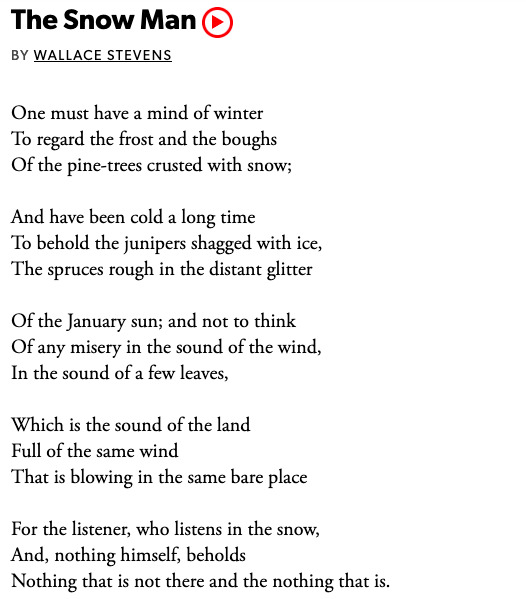
One must have a mind of winter To regard the frost and the boughs Of the pine-trees crusted with snow; And have been cold a long time To behold the junipers shagged with ice, The spruces rough in the distant glitter Of the January sun; and not to think Of any misery in the sound of the wind, In the sound of a few leaves, Which is the sound of the land Full of the same wind That is blowing in the same bare place For the listener, who listens in the snow, And, nothing himself, beholds Nothing that is not there and the nothing that is.
Wallace Stevens, "The Snow Man," from Collected Poetry and Prose
73 notes
·
View notes
Note
i was rereading sssbmty and I realised smth, well not realised but yeah. as I was rereading I noticed somthing. Ed was bitch. not like 'omfg Ed ur such a bitch' but like 'wtf Ed? ur such a fucking bitch! jesus...' and then I got to alabasta.
ur a genius, I've read other fics like this for example divergence and another one I cant remember the name of (going to read this bites soon... maybe). but what really puts your fic at the tippity top is giving Ed character development, not a whole fucking arc to them obvi but giving them actual character development. Ive read so many what if I was in... but I rarely see authors giving the oc development because they don't think about it or they don't think they do.
but in alabasta, Ed was saying how no one listens to them and saying how they're always right (kind giving ranpo from bsd) but then the straw hats tell them that they don't say anything with conviction.
they basically tell them (incoming poetry made by mwah) that we cant hear you screaming if youre the one keeping your mouth shut.
yeah you can use that for future reference I'm an amazing poet fr fr but its really an eye opener for ed, so far Ed was making theories with no support or little evidence and everyone went along with it. so it doesn't really make any sense to Ed why no one is listening to them. because they haven't realised that even tho they're right about where to go, its vivi's country. vivi isn't their friend because she doesn't like Ed which further dampens ed's theories on where to go because it ties into vivi and hope. there's an analysis on YouTube by MelonTree (I reccomend her entire chanel) which gets deeper into this. but the straw hats trust vivi and want what's best for her. so when Ed is screaming about where to go, they don't say WHY. they don't further in on how vivi's destination is wrong or how there's other possibilities. instead, Ed tells vivi that's its stupid, we're wasting time, I know where to go, why wont you listen.
they aren't listening to Ed because Ed isn't even listening either. Ed was making bets on vivi's country which is a funny gag, is INCREDIBLE dark to her. she has spent years invading buroque works and when she encounters this strange pirate crew they want to help. but this one crew mate isn't serious and theyre laughing and screaming at her because she's wrong. that is the pov of vivi towards Ed.
so Ed and vivi talk it out and here comes Ed, they realize that even tho I'm on the crew, that doesn't mean I'm likable. its seen through the fic that they start to work on themself and provide more evidence to theyre theories.
another thing, the title was familiar, idk why so why when I ask chatgpt what the title is: it doesn't talk about the fic but a fucking poem from the 1920's!?
"Surely some star binds me to you" is a line from the poem "Tea at the Palaz of Hoon" by Wallace Stevens. This poem, found in his collection "Harmonium" (published in 1923), explores themes of self-identity, imagination, and perception.
The line suggests a mystical or cosmic connection between the speaker and the addressee, implying that their bond is predestined or influenced by the stars. It evokes a sense of fate and the interconnectivity of all things, typical of Stevens' abstract and introspective style.
In this context, the "star" symbolizes an inescapable connection, potentially representing destiny, love, or an elemental link between individuals.' WHAT THE FUCK? anyway I'm burnt out and finished rereading the fic so imma go have ice cream like the dumbass I am ;p
Oh this is a fucking mammoth. For your dash's sake I'm putting this under a break lmaoooo
Ed having ✨issues✨ they had to work through was important to me. Hell Ed still having ✨issues✨ they're working through is still important to me. You know when people do those comparisons of a character at the start of a season and the end and they're just so much sadder and fucked up? The goal was to make that Ed. We'll see how that goes. I'm gonna 'to be loved is to be changed' this bitch if it's the last thing I do.
Ed has that kid in your math class that only writes the answer because showing your work is for cowards inside them. Ed fights that kid inside them like they want his lunch money.
I've watched a couple of MelonTree's videos, they are very good.
Idk what the hell ChatGPT is on but like... that is not correct? I went and read the poem, it's quite nice, but there isn't a single use of the word star in it and the line definitely isn't from it. THIS IS WHY I DON'T TRUST AI AIGHT????
I've mentioned it a couple times before, but the title comes from Persius's Satire 5, it's in Latin and there's a couple translations here and here (neither of which have the line as I have written lmao) and I'm sure plenty of others. The line is about his teacher and is very beautiful ok I like it a lot. I went and did a bunch of digging into it a while ago (because of course my stupid ass didn't do more than preliminary research on it before I NAMED MY FIC AFTER IT) and like... y'all....
(I'm paraphrasing because I'm tired and can't be assed to do more than reread the wiki page this shit) Persius's satires critique societal morals (he also gets upset people like other people's poems more than his but that might be ironic idk these things are DENSE and HARD TO READ), discuss themes of what you can ask of the gods, why you should have goals, why you have to know yourself, MOST IMPORTANTY and in the satire the line comes from; Stoicism and freedom (Stoics believe all men are slaves except Stoics, who are free), and how you should use money. Also very interesting, there's a lot of scholars who believe his satires (mostly the first one, I think??) have anti-Neronian sentiments — which is really fucking funny to me specifically because do y'all (if you're caught up) remember Iva talks about the 20 founding members of the WG and about Nerona Imu? And how empty throne Imu could totes be him if he had the eternal youth surgery thingy??? Idk if Nerona actually has anything to do with the emperor Nero (because of translation diffs and any subtleties in the original Japanese I'm too English speaking to understand) or if they just sound similar in English, but it's a hilarious coincidence to me either way.
OK RANT OVER GANG I'M SORRY.
#sssbmty#one piece#one piece ocs#I#I am so mentally ill#I have been trying to read the whole of Persius's satires for a while but please#it's hard#it's hard and I'm stupid#is this theorizing???? I'm theorizing a bit#Well mostly ranting but whatever#One Piece spoilers#I guess
36 notes
·
View notes
Text

The sixth annual National Book Awards were presented at the Hotel Commodore on January 25, 1955. Three of the winners were (L to R) Joseph Wood Krutch, for The Measure of Man; William Faulkner, for A Fable; and Wallace Stevens, for The Collected Poems of Wallace Stevens.
Photo: John Rooney for the AP
#vintage New York#1950s#John Rooney#National Book Awards#Joseph Wood Krutch#William Faulkner#Wallace Stevens#awards#Jan. 25#25 Jan.#literature
17 notes
·
View notes
Text
Earlier this year, the visionary poetry critic Helen Vendler died at the age of ninety. After her death, the writer and psychoanalyst Christopher Bollas—author of The Shadow of the Object, Cracking Up, and Meaning and Melancholia, among many others—collected a correspondence between himself and Vendler that unfolded over email during the last two years of her life, which began as Vendler was clearing out her office at Harvard in 2022. These emails, which have been selected and edited by the Review (with spelling and punctuation left unchanged), touch on the relationship between psychoanalysis and poetry; the experience of aging in all its forms; and the growth of a friendship, and understanding, between Bollas and Vendler.
Vendler to Bollas ... It made me genuinely happy to see the parallels in lifting what may seem (but is not) accidental into visibility. The unknown known is a wonderful way of putting it. I think that the poets may be able to know more of the unknown known than the analysand, since the composition of poetry is a way to elicit it in symbolic form. And your explanation of the multiplicity of things to be inferred from words, gestures, emotions—and the tendency of those things to arrange themselves like iron filings to a magnet (as Donne says—“And Thou like adamant draw my iron heart”—) has its strict analogue in the way in which, after one immerses oneself (ideally) in everything an author wrote, those magnetic forms arise in my mind as “explanations” of stylistic gestures in a poem. One can’t command them; they have to rise as the result of a long process. The frustration of not being able to understand something by will alone makes me remember a summer in which I was working very hard to understand Stevens’s long poems. I would teach summer school all morning, return and be with my son from noon till 7 (when he would fall asleep), and then going to my library office after the arrival of the babysitter, and work till late. It was a taxing schedule, but usually I could make progress. One night I was so despairing of figuring out 3 lines in Stevens’s last long poem that I burst into tears; then I suddenly heard a young voice behind me at my open office door in the deserted Smith library saying “Oh Mrs. Vendler, I’m just taking my sister—” and then broke off in an apology, seeing the tears running down my cheeks. I imagined she thought she was interrupting some tragic experience, and I didn’t want her to think that, so I said unthinkingly, “I’m all right, I was upset because I just couldn’t understand a passage in Wallace Stevens.” She probably thought anyone who wept for that reason was very peculiar. But in reading your passages in various essays where you say, “I was pondering X” or “I was piecing together,” or some other phrase intimating how much thinking you have to do to glean the visible off the impalpable in the analytic process, I felt that your thinking resembles mine—though for different reasons and for different results. And the “evidence” is often so “accidental”: I remember thinking about how Stevens used the definite and indefinite articles, and being frustrated because they were not included in the (predigital) Concordance. [...]
4 notes
·
View notes
Text
On the Mt. Rushmore of Knopf poetry, which dates back more than a century now, the craggy profiles of Langston Hughes and Wallace Stevens would be joined by, among others, Anthony Hecht (1923-2004). His Collected Poems arrived this fall, in a handsome edition edited by Philip Hoy, who reminds us that Hecht himself felt poetry could “recover for us what he memorably called ‘the inexhaustible plenitude of the world.’” Here is “Memory,” originally from his late volume The Darkness and the Light.
Memory
Sepia oval portraits of the family, Black-framed, adorned the small brown-papered hall, But the parlor was kept unused, never disturbed. Under a glass bell, the dried hydrangeas Had bleached to the hue of ancient newspaper, Though once, someone affirmed, they had been pink. Pink still were the shiny curling orifices Of matching seashells stationed on the mantel With mated, spiked, wrought-iron candlesticks. The room contained a tufted ottoman, A large elephant-foot umbrella stand With two malacca canes, and two peacock Tail-feathers sprouting from a small-necked vase. On a teak side table lay, side by side, A Bible and a magnifying glass. Green velvet drapes kept the room dark and airless Until on sunny days toward midsummer The brass andirons caught a shaft of light For twenty minutes in late afternoon In a radiance dimly akin to happiness— The dusty gleam of temporary wealth.
More on this book and author:
Learn more about Collected Poems by Anthony Hecht.
Browse other books by Anthony Hecht and check out Late Romance, David Yezzi's recent boigraphy of the poet.
Visit our Tumblr to peruse poems, audio recordings, and broadsides in the Knopf poem-a-day series.
To share the poem-a-day experience with friends, pass along this link.
#HechtAudio#Poem#Poetry#Knopf Poetry#Knopfpoetry#poem-a-day#national poetry month#anthony hecht#memory#collected poems#knopf#poems
7 notes
·
View notes
Photo
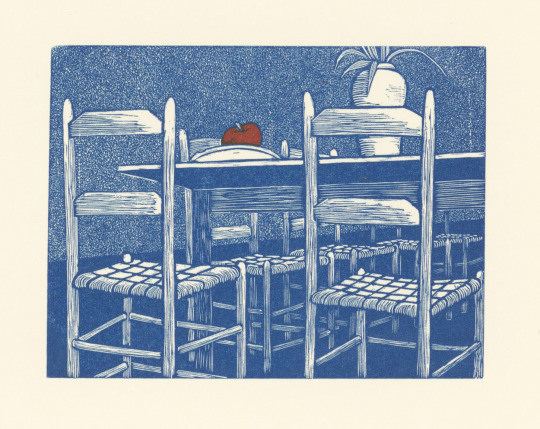

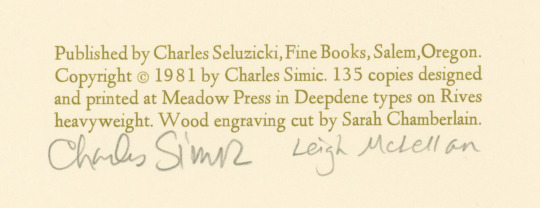
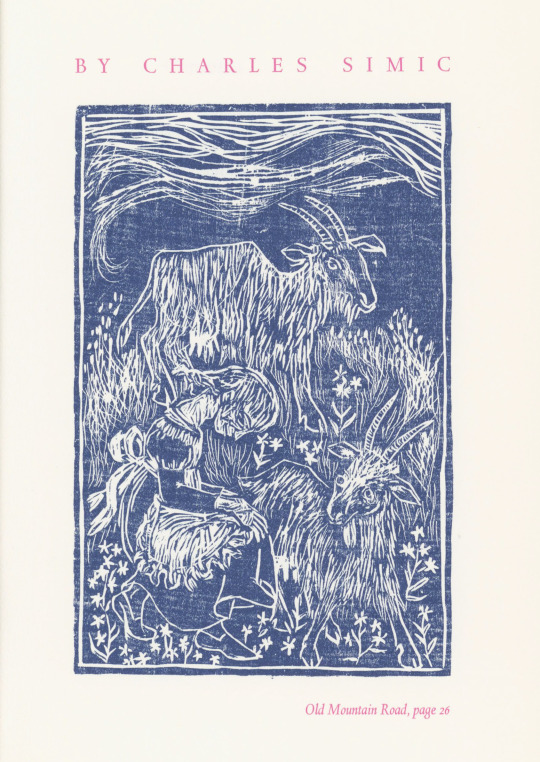

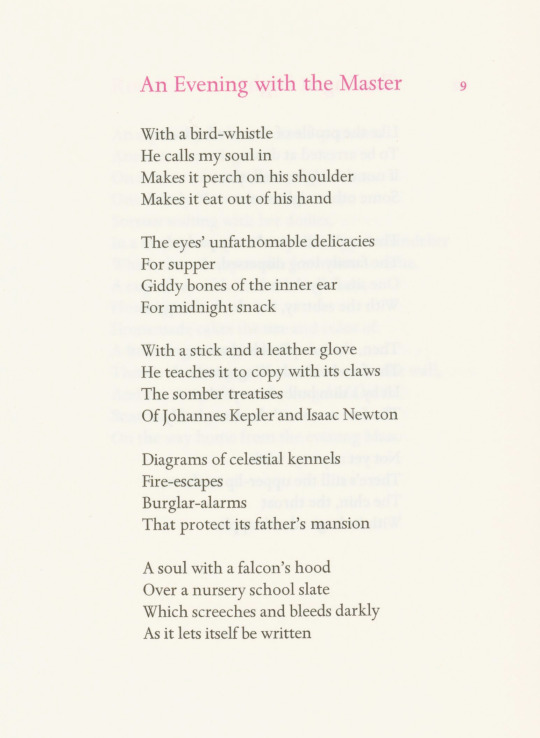
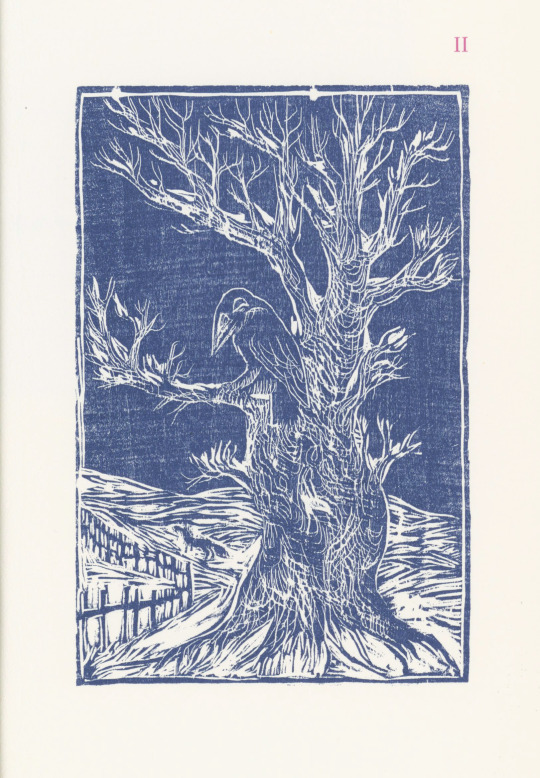

In Memoriam: Charles Simic, 1938-2023
The Serbian-born American poet Charles Simic passed away this Monday, January 9, 2023. In memory of him and his work, we are sharing two pieces that feature his poetry that are illustrated with wood engravings. Simic was awarded the Pulitzer Prize in 1990, a MacArthur Foundation “genius grant,” the Griffin International Poetry Prize, the Wallace Stevens Award, and an appointment as US poet laureate.
The first item shown here is a broadside published by Charles Seluzicki in 1981, printed at the Meadow Press with a wood engraving by Sarah Chamberlain. It features the poem “Interlude” by Simic, and is signed by both Simic and the printer/designer, Leigh McLellan.
The second piece shown here is the book Shaving at Night by Charles Simic, with three wood engravings by Helen Siegl, published in 1982 also printed and designed by the Meadow Press. Each engraving accompanies a poem from the book.
When I was in college, I remember reading a Charles Simic prose poem that had something to do with trees in a literature class (I can’t for the life of me remember the title), and I just remember the image it created in my head and thinking “wow.” I hope that Simic’s work will continue to inspire young poets and readers for many years to come. May he rest in peace.
View more posts with work by Charles Simic.
View more posts with work by Sarah Chamberlain.
View more posts with work by Helen Siegl.
View our other In Memoriam posts.
-- Alice, Special Collections Department Manager
#Charles Simic#In Memoriam#Poetry#poets#broadsides#Sarah Chamberlain#Meadow Press#Charles Seluzicki#Leigh McLellan#Helen Siegl#Shaving at Night#Interlude#wood engravings#Pioneer Valley School#RIP#Alice
85 notes
·
View notes
Note
1, 2, 6 for book questions!
How many books did you read this year?
159 as of today; i expect to finish a few more next week if not this weekend.
Did you reread anything? What?
sonnets from the portugeuse by elizabeth barrett browning
tlok turf wars comics
the heroes of olympus series by rick riordan
gilgamesh: a verse narrative by herbert mason
a series of unfortunate events, the bad beginning and the reptile room by lemony snicket - meant to read more, but i've been reading them out loud to my brother and it's hard to find the time
howl's moving castle trilogy by diana wynne jones
blue beetle (2006) comics by keith giffen and john rogers
uprooted by naomi novik
the odyssey (emily wilson translation)
the iliad (wilson's translation as well, which was not a reread, but i have read the iliad before lol)
selected poems by william carlos williams
earthsea series by ursula k. le guin (in progress)
collected poetry and prose by wallace stevens (in progress)
Was there anything you meant to read, but never got to?
i was going to read interview with the vampire for halloween and forgot and then halloween was over. many other things too but that one i actually feel a little guilty about
7 notes
·
View notes
Text

The Old Guitarist
Artist: Pablo Picasso (Spanish, 1881- 1973)
Movement: Picasso's Blue Period, Expressionism
Year: 1903-1904
Medium: Oil on Panel
Collection: Art Institute of Chicago, Chicago, Illinois
The Old Guitarist was painted in 1903, just after the suicide death of Picasso's close friend, Casagemas. During this time, the artist was sympathetic to the plight of the downtrodden and painted many canvases depicting the miseries of the poor, the ill, and those cast out of society. He too knew what it was like to be impoverished, having been nearly penniless during all of 1902. This work was created in Madrid, and the distorted style (note that the upper torso of the guitarist seems to be reclining, while the bottom half appears to be sitting cross-legged) is reminiscent of the works of El Greco.
This bent and sightless man holds close to him a large, round guitar. Its brown body represents the painting's only shift in color. Both physically and symbolically, the instrument fills the space around the solitary figure, who seems oblivious to his blindness and poverty as he plays. At the time the painting was made, literature of the Symbolist movement included blind characters who possessed powers of inner vision. The thin, skeleton-like figure of the blind musician also has roots in art from Picasso's native country, Spain. The old man's elongated limbs and cramped, angular posture recall the figures of the great 16th-century artist El Greco.
A perfect companion piece is Wallace Stevens's poem, "The Man with the Blue Guitar." The poet puts words to Picasso's belief that art is the lie to help us see the truth. Stevens writes:
"They said, 'You have a blue guitar, You do not play things as they are.' The man replied, 'Things as they are Are changed upon the blue guitar.'
As a metaphor for the need to immerse oneself fully in one's grief in order to heal, Denise Levertov's poem, Talking to Grief is also apropos.
The Old Guitarist is probably the most iconic painting of Picasso's Blue Period when he was living in poverty and emotional turmoil.
#oil on canvas#old guitarist#guitar#pablo picasso#spanish art#art institute of chicago#guitarist#man#grief#blue period#expressionism
1 note
·
View note
Text

NEW FROM FINISHING LINE PRESS: Some Moments in a Gentle War by David MacRae Landon
On SALE now! Pre-order Price Guarantee: https://www.finishinglinepress.com/product/some-moments-in-a-gentle-war-by-david-macrae-landon/
This collection of #poems borrows its title from a line of the second poem, “Kleos, or Fame”. “Kleos” also begins the story of the #war, “gentle” because it is a commitment, at times a struggle, to care: for each other and our #world, from moment to moment, from day to day. To fight the gentle war is to live in opposition to another war, a war associated in several of the poems with “history”: reckless ambition, abuse of power, indifference to suffering, violence. There are moments—at times mysterious—when we feel the gentle war may win, so let’s celebrate, let’s remember those moments. In iambic pentameter? It is a meter usually more vigorous than gentle. But there are moments we want to remember and celebrate with vigor!
David Landon is the Bishop Juhan Professor of Theatre Emeritus at the University of the South in Sewanee. He won the American Academy Poetry Prize as an undergraduate at Harvard, where he was class poet. More recent poems have appeared in Able Muse (Write Prize), Southwest Review (Marr Prize, runner-up), Georgia Review (Lorraine Williams Prize, featured finalist), and elsewhere. As an actor he has performed with the Nashville, Alabama, and New York Shakespeare Festivals, with the Provincetown and New Orleans Tennessee Williams’ Festivals. Several of his undergraduate poems were republished in the Harvard Advocate Centennial Anthology (T. S. Eliot, Wallace Stevens, E.E. Cummings, etc.).
PRAISE FOR Some Moments in a Gentle War by David MacRae Landon:
In the intimate voice of a wise friend over a glass of wine, Landon’s poems both narrate and participate in a “gentle war”—that is, a quiet but noble campaign “to take back history from violence.” In locations ranging from the Metropolitan Museum to a rural Piggly Wiggly, Montaigne and Bach are at home, but so are the mundane details of unfolded laundry, a paper cup—all invested with what Landon calls “magic.” The enchantment is in the verse itself, a deftly conversational form distilled from Landon’s years as a Shakespearean actor. But don’t be fooled: these captivating poems are as current as today’s news, and give the reader strength to bear it.
–Jennifer D. Michael, Author of Let Me Let Go and Dubious Breath (Finishing Line Press)
In this splendid new collection, David Landon mines quotidian experience for its luminous gists, finding them as he conjures Montaigne late one night in a corner of the Piggly Wiggly parking lot in Monteagle, TN, or recalls a moment of in-flight pizzaz approaching Idlewild. These are poems in which the trials of life, the inevitable disabilities of advancing age, are met with a joyful exuberance. The gentle war is the war against entropy and despair, fought with love, hope, and gratitude. This is a book which discharges and inspires gratitude.
–Charles Martin, author of The Khayyam Suite (Johns Hopkins, 2025)
With clarity and formal grace, Some Moments In a Gentle War traces the contours of a life richly experienced. David Landon’s voice is frank, erudite, and threaded with surprising tenderness as he reflects on the passage of time and honors “the art of day to day.” These are poems to celebrate and cherish.
–Caki Wilkinson, author of The Survival Expo
Please share/repost #flpauthor #preorder #AwesomeCoverArt #read #poems #literature #poetry #war
#poetry#flp authors#preorder#flp#poets on tumblr#american poets#chapbook#chapbooks#finishing line press#small press
1 note
·
View note
Text
Last spring, when his daughters were teen-agers, Wiman became so sick that he could barely get out of bed. He was accepted into an experimental trial and became one of the first people with Waldenström’s to undergo chimeric-antigen-receptor T-cell therapy, or car-T. The treatment involves intravenous drips of the patient’s own T cells, reëngineered in a laboratory to bind with specific antigens on the surface of the patient’s cancer cells. “I don’t think anyone thought it would work,” Wiman’s friend the novelist Naeem Murr told me. The drip, Murr said, “looks like nothing, a thimble of clear nothing. But it worked, he went into a complete remission. It was miraculous.”
Although Wiman is among the most distinguished Christian writers of his generation, he is uncomfortable with the word “miracle.” But he doesn’t have an alternative description for what happened last Easter or after any of the other treatments that have kept him alive for the past nineteen years. In his new book, “Zero at the Bone,” he writes, “I had—have—cancer. I have been living with it—dying with it—for so long now that it bores me, or baffles me, or drives me into the furthest crannies of literature and theology in search of something that will both speak and spare my own pain. Were it not for my daughters I think by this point I would be at peace with any outcome, which is, I have come to believe, one reason—the least reason, but still—why they are here.”
“Zero at the Bone” takes its title from Emily Dickinson, but its subtitle is a surprising salvo for a poet: “Fifty Entries Against Despair.” The book has fifty short chapters, plus two naughts—one at the start and another at the end, each labelled “Zero”—for a total of fifty-two, like the weeks in a year or the playing cards in a deck. The entries come in varying shapes and sizes. One begins with autobiography and ends with one of Wiman’s poems, another starts with a meditation on Wallace Stevens and closes with Teresa of Ávila. Some are single poems; others, commonplace collections of excerpts from the likes of the Swiss theologian Karl Barth’s “The Word of God and the Word of Man” and the Hungarian writer Imre Kertész’s “Kaddish for an Unborn Child.”
Like nearly everything Wiman has written, the entries in “Zero at the Bone” circle or depart from or come back to his faith. Raised a charismatic evangelical, he went to church three times a week in his childhood, abandoned Christianity in his twenties, then returned to religion around the time of his diagnosis—although it was his marriage, he says, not cancer, that brought him back to God. Still, like the writings of so many of the suffering saints Wiman admires, his work seems inextricable from the death he has so far escaped. He is fifty-seven now, and he worried that he might die before “Zero at the Bone” was published, until the latest experimental treatment saved his life once again. Now he hopes that his experimental book—part poetry anthology, part memoir, part theological treatise—can help others live.
[...}
It seems to have worked: it’s difficult to square Wiman’s history of aggression and dysfunction with the man he is today. Still, he retains some of the intensity of his youth, especially in his sky-blue eyes, which he sometimes closes to think. His childhood wasn’t all violence, he feels the need to say—there was beauty, too. The beauty of language; dialects he pocketed like coins, then spent in poems about home like “Five Houses Down,” with a neighborhood junk collector whose “barklike earthquake curses / were not curses, for he could goddam / a slipped wrench and shitfuck a stuck latch.” And the beauty of mesquite trees, tumbleweeds, and dust devils, the last of which he re-creates in a narrow wisp of a poem:
of flourishing vanishing
wherein to live is to move
cohesion illusion
wild untouchable toy called by a boy
God’s top
#The New Yorker#words and writing#Christian Wiman#poetry#poem#cancer#reading and writing#my favorites#Christianity
6 notes
·
View notes
Text

VIII She hears, upon that water without sound, A voice that cries, "The tomb in Palestine Is not the porch of spirits lingering. It is the grave of Jesus, where he lay." We live in an old chaos of the sun, Or old dependency of day and night, Or island solitude, unsponsored, free, Of that wide water, inescapable. Deer walk upon our mountains, and the quail Whistle about us their spontaneous cries; Sweet berries ripen in the wilderness; And, in the isolation of the sky, At evening, casual flocks of pigeons make Ambiguous undulations as they sink, Downward to darkness, on extended wings.
Wallace Stevens, excerpt of "Sunday Morning," from Collected Poetry and Prose
1 note
·
View note
Note
As a novice poetry reader, could you kindly provide a Coles Notes on Dickinson/a few poems to fall in love with, or, point me in the direction of a good introductory resource?
If you start around minute 38 in this video lecture from an Intro to Lit course, I explicate "I Heard a Fly Buzz—When I Died" as part of a constellation with other poems by Gerard Manley Hopkins and Wallace Stevens. It should suggest some of her general virtues.
youtube
There's a very slim volume edited by Joyce Carol Oates, The Essential Emily Dickinson, that collects her most famous poems, if not necessarily her best (I haven't read every poem myself; it's a large oeuvre). I don't know if it's a good critical introduction, but Susan Howe's My Emily Dickinson—another slim volume—is a classic of poet's criticism, liberated from academic constraint; I wrote about it here. On a more introductory note, here's a slide on Dickinson's poetics I made for an American Lit survey course:

Why do I love her? If for nothing else, she's a master of rhythm. With a not-necessarily promising instrument—hymn meter—she can play any note. One of my favorites in this vein is "He Fumbles at Your Soul," about God or a favorite poet or a gifted preacher or even a lover. Read it out loud a couple of times. And then there is her conceptual daringness—stressed by Harold Bloom in his essay on her work in The Western Canon—a Blakean counter-Christianity sly and subtle, as in the list of possible meanings for "he" in the poem just above, but sometimes wittily self-mythologizing, as in the beloved "Because I Could Not Stop for Death," which I had to memorize in middle school (I kept calling Death "she" because I was then, at age 13, in fictional love with her), or the more explicit "The Bible Is an Antique Volume—," not to mention her counter-Romantic sense of nature's existential menace as well as its generative beauty, as in "A Narrow Fellow in the Grass." Finally, I think of her palpable, alluringly vague eroticism—emphasized by Paglia in Sexual Personae, with perhaps an excessive focus on the Sadean—as in "I Started Early—Took My Dog—" Overall, the vision of an extraordinarily original sensibility arises from her poems.
3 notes
·
View notes
Text

Alredered Remembers Wallace Stevens, American Modernist poet who won the Pulitzer Prize for Poetry for The Collected Poems in 1955, on his birthday.
"Death is the mother of beauty. Only the perishable can be beautiful, which is why we are unmoved by artificial flowers."
0 notes
Text
“i remember the afternoon i sat in a literature class, my hardback edition of the collected poems of wallace stevens open before me, a book i had already owned for years, the pages worn and softened by endless turning and fingering, page after page filled with marginalia, notes, the definitions of words, question marks, exclamation marks, and underlinings, all in the soft gray graphite of my own living penciling hand, when a distracted classmate i did not know very well leaned over my book and wrote in it with her ballpoint pen: i’m so bored!!! are you going to the party tonight? i remember feeling like my blood had stopped and reversed course, not in the heart, where that is supposed to happen, but midvein, the feeling medically called shock. i remember trembling and soaring with anger, and i remember the weekend after the unfortunate incident took place, sitting for hours and hours in my room with a new book, trying to cope, copying by hand everything I had ever written in the old book, with the exception of that one bold, sorry, uninvited guest.”
— mary ruefle, “i remember, i remember,” madness, rack, & honey
1 note
·
View note
Text

Published in 1954, The Collected Poems of Wallace Stevens was envisioned by the poet himself as constituting a single Grand Poem: "The Whole of Harmonium." See Richard Allen Blessing's "Wallace Stevens' 'Whole Harmonium.'"
0 notes